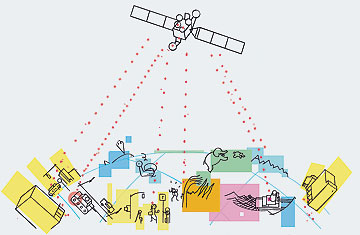
February 14, Cape Canaveral, Florida, U.S.
At 6:30 p.m. on Valentine's Day, 1989, a Delta rocket blasted off from Cape Canaveral and shot through the Florida twilight carrying a satellite prosaically known as Space Vehicle Number 14. Weighing roughly the same as a family car, and destined for an orbit of more than 12,000 miles (19,000 km) above our planet, the satellite was the first in a constellation of 24 making up the global positioning system (GPS). Along with the Internet, GPS is one of the great enabling technologies of our globalized age, and we have only begun to mine its seemingly limitless applications.
Developed by the U.S. Department of Defense — it had tested Navstar satellites as early as 1978 — GPS is a sophisticated system that does something very simple: it establishes, with great accuracy, your position on Earth. The satellites emit continuous radio signals that receivers translate into longitude, latitude, altitude, speed and time. Five years after SVN 14's launch, Navstar GPS — to use its official name — became fully operational at a cost of $12 billion in American taxpayers' money.
What a bargain. Operated by the 50th Space Wing at Schriever Air Force Base in Colorado, GPS started out by transforming modern warfare. Its satellites guided U.S. troops through sandstorms during Desert Storm in 1991 and the missiles used to "shock and awe" Baghdad in 2003. Today, almost everyone in a modern army — fighter pilots, tank crews, quartermasters — uses the technology. An emerging generation of commanders might struggle to imagine how wars were ever successfully waged without it.
Navstar GPS was designated as dual-use, a military technology also offered free to civilians. But for years, the Department of Defense deliberately degraded the signals to render them less accurate for nonmilitary purposes. Since 2000, when this policy was scrapped, GPS has gone from being a futuristic technology reserved for the U.S. military and Hollywood fantasists, to near ubiquity — from dual-use to omni-use.
GPS can be used to make maps, survey land, search and rescue, hunt for treasure, arrange car pools, track endangered species, monitor oil spills and — by shutting down her phone above a certain speed — stop your teenage daughter from texting while driving the family car. Greenpeace has used GPS receivers to expose the illegal trade in electronic waste from Britain to Nigeria. A British company has found a way to use GPS-enabled cell phones to calculate your carbon footprint.
Europe is developing a GPS system called Galileo. China is investing in Galileo and, in April, launched the second satellite in a constellation that will one day rival it. Russia's Soviet-era GLONASS system, restored with the help of India's space agency, plans to go global. Last year then Russian Defense Minister Sergei Ivanov gave Prime Minister Vladimir Putin a GLONASS-enabled collar for his Labrador Koni. "She looks sad," Ivanov reportedly said, after Putin had put the collar around his dog's neck. "[Her] free life is over." Koni's owner disagreed. "She's wagging her tail," said Putin. "That means she likes it."
Not all of us are wagging our tails. In 2006, the Australian Privacy Foundation gave a Big Brother Award to a junk-mail company that used GPS units to track its delivery staff. The following year, thousands of New York City taxi drivers went on strike to protest plans to put similar units in every cab, which some drivers felt was an invasion of privacy. (The plans went ahead anyway.) The Egyptian government is so worried about giving a technological aid to terrorists that it has banned all GPS-enabled devices. The iPhone debuted in Cairo this year without its navigation feature.
GPS has changed our lives for better and worse. A cell phone can quickly locate my tent amid a field of Glastonbury mud, but it also abolishes a rite of passage: getting serendipitously lost at a rock festival. Strapping a GPS-enabled watch to my son's wrist might bring me peace of mind, but it will do nothing to make the streets safer for our children. On a planet of 6 billion souls, GPS helps us to find ourselves. But it sometimes dazzles us so much that we forget what we still seek.